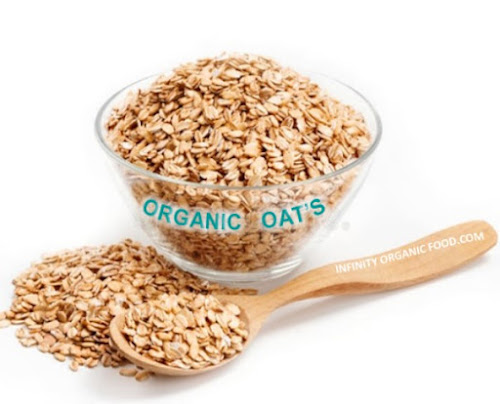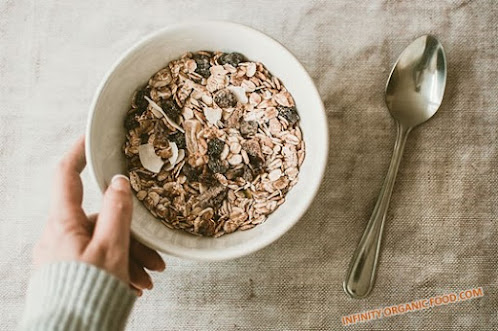ORGANIC Oats
Oats are becoming the
favorite breakfast worldwide. The popularity of this ‘super grain’ is
associated with its affordability and its health benefits. Oats are a type of
whole-grain cereals that are grown for their seeds. When we talk about organic
oats it’s produced under the organic methods of farming, like crop rotation,
using natural pesticides and fertilizers, instead of using synthetic
fertilizers, and pesticides or chemicals which have many health risks. Because,
during eating non-organic oat’s may some of the chemicals like herbicides or
pesticides, that used during non-organic oats farming may digest in your
body.
Scientists say that if
you eat whole oats intact in breakfast, they fill up your needs of essential
fiber, carbohydrates, minerals, and vitamins, and provide energy for the whole
day. Whole oats take time to cook so they are preferably rolled or crushed into
flat flakes and ground into oat flour. Its flakes are toasted to form oatmeal
which is primarily eaten as porridge. Oat bread, oatcakes, muffins, and oatmeal
cookies are some baked forms of organic oats. Granola bars, muesli, and oat
milk are also made using oats.
If you want to keep
yourself healthy and live longer then you should incorporate this super grain
in your diet. You will lose weight and have a low risk of blood pressure, bad
cholesterol, diabetes, and digestion problems if you intake a good amount of
organic oats daily.
Types of Oats
Mainly
there are three types of oats based on their processing.
·
Steel-Cut: They
are made up of whole groats and contain most of the nutrients intact in the
grain. They look like grains of rice. They are usually cooked by simmering them
in water or milk for a long time and has a chewy texture.
·
Rolled: They
are often called the old fashioned oats. The oat grains are softened first by
steaming and then processed to flat. They absorb more liquid and cook in less
time than steel-cut. During cooking, they can hold their shape better.
·
Instant: As
the name depicts, you can cook them quickly. They are often called quick oats.
They are pre-cooked, dried and rolled. They are a little thinner than the
rolled ones and cannot maintain their shape during cooking.
You can use any type of
organic oats according to your recipe and taste. You just have to adjust the
liquid and cooking time. Rolled and instants oats can be prepared in a
microwave.
Health benefits
of Organic Oats
Organic oats are a well-balanced
source of nutrients like minerals, most B vitamins, and antioxidant plant
compounds. They contain carbohydrates and fiber in large quantities, unlike
other fat-rich seeds. They also contain many plant proteins and fats.
Let's review some of the health benefits:
1. Rich in Antioxidants
Avenanthramides are the key antioxidants that are present
in organic oats. It is suggested that these antioxidants increase the
production of nitric oxide by which the blood pressure is lowered and
stabilized. Nitric oxide helps to make the blood flow better by dilating the
blood vessels. Whole oats have also anti-inflammatory and anti-itching effects
due to these antioxidants. Ferulic acid is another antioxidant present in large
quantities in organic oats.
2. Rich in Soluble Fiber (Beta-Glucan)
Organic oats contain a high quantity of a dietary fiber
which is called beta-glucan. If you are having a quarter cup of dry oats in
your breakfast then you will get 5 grams of beta-glucan. It usually makes a gel-like
solution in the stomach due to its partially soluble nature in water.
Beta-glucan has many health benefits including reducing cardiovascular diseases,
helps in the production of good bacteria in the stomach, and promotes the
health of the immune system.
3. Reduce Total Cholesterol Levels and LDL Levels
The leading cause of
worldwide death is attributed to heart diseases and its major cause is high
cholesterol levels. Many pieces of research have shown that beta-glucan which
is primarily present in organic oats can help reduce LDL and total cholesterol levels
both.
The excretion of bile (rich in cholesterol) is enhanced by
beta-glucan by which the circulating levels of LDL or bad cholesterol are
reduced in the blood. The risk of heart attack is also reduced by consuming
organic oats daily as beta-glucan can protect the cardiovascular tissue and
arteries from getting inflamed.
4. Reduce Blood Sugar Level
Beta-glucan present in organic oats is responsible for the
formation of thick gel in the stomach which in turn helps to delay the
absorption of glucose in the blood. That’s why they are helpful for the
lowering of blood sugar levels and improve insulin sensitivity especially in
the overweighed people or in the patients of type 2 diabetes.
5.
Enhance
the Feeling of Fullness
There is a satiety hormone PYY usually produces in the gut
while eating. It tells the brain when you are full and should stop eating. Its
production is increased when you eat organic oats due to its fiber-rich nature.
So by having oats in breakfast, you will feel full early and for many hours you
will not intake calories which in turn helps you lose weight.
6.
Help
Skin Care
Organic oats can be employed as solutions for different
skin diseases. They can be applied to the skin to lessen the symptoms as well
as the actual infections. Some of the conditions which can be controlled with a
local application of oats include acne, dermatitis, chickenpox, and stress
rashes.
7.
Reduce
the Risk of Asthma in Children
The most common chronic disease in children is Asthma. Combining
organic oats to an infant’s diet can reduce the risk of asthma. It also helps
in stopping the onset of other allergic conditions among children.
The usually questions by
the people about oats.
What is oat? And how it make.
All types of oats are made of whole oat groats (Avena
sativa). Whole oat grouts are difficult to cook, as they take more time and
liquid. Due to this reason, they are generally rolled or flattened into flakes
and lightly toasted to make oatmeal. Steel-cut oats are also preferred due to
their chewy texture and have more nutritional content.
Whole oat grains consists
of four parts:
1.
Germ: The
central part of oat grain is germ which is responsible for new growth. It
consists of many nutrients such as B vitamins and fats.
2.
Endosperm: It
is the largest part of the grain and consists of many carbohydrates for energy.
3.
Bran: The
coarse outer layer of the grain is called bran. It is fiber-rich,
multi-layered, and edible. It is often used as a cereal separately in breads or
with muesli.
4.
Hull: It
is a protective cover surrounding the oat grain. It is inedible and fibrous. It
is often cut off during refining and burned as a fuel.
What is the best way to eat oats?
There are several ways to enjoy oats. Eating porridge
(oatmeal) in breakfast is the most preferred way to incorporate organic oats in
the diet. Here is the most simple way to make porridge:
Add a half cup of rolled oats in a cup of water or milk in
a pot. Add a pinch of salt into it and bring it to a boil. Then cook the oats
on a low flame with stirring, until they become soft. You can make your
porridge tastier and more nutritious by adding fruits, nuts, cinnamon, and/or
Greek yogurt. Organic oats are commonly incorporated in many baked items,
granola bars, muesli, and bread.
Are organic oats more expensive than non-organic oats?
Organic oats or even any organic food are good for your
health and for the environment, but at the same time costs more than 20% of the
non-organic food according to USDA. Organic oats or organic food are also more
expensive than synthetic ones.
Here the basic is to know, are organic oats or organic food worth extra cost? We can say “Yes”. Because, Organic Oats or organic food are grown under the organic methods of farming, using natural pesticides and fertilizers, instead of using synthetic fertilizers, and pesticides which have many health risks, like type 2 diabetes, cancers and even parkinson’s disease.
I have no faith that if you consume even small amounts of synthetic pesticides by eating non-organic oats daily for your whole life will be good for your health. I would rather suggest you spend a bit more money on organic oats rather than a lot more on health care later on.
Are organic oats
good for seniors?
Yes, organic oats are
good for seniors in a sense of! it’s free of pesticides and herbicides or other
toxins. Oats help the elderly people to relieve constipation. Constipation is
often experienced by elderly people. It also accompanied by infrequent, and
irregular bowel movements that are not easy to pass.
The medicine which is
used to fight against constipation in the elderly is laxatives. But laxatives
have side effects like weight loss and the quality of life is reduced.
Many studies have shown
that if older people eat oat bran (fibrous outer layer of grain) daily, it will
help them to relieve constipation. A study was done on two groups of older
patients of constipation who were using laxatives. After the 3-month study, 59%
of patients who included soup and desserts made of oat bran in their diet, were
able to quit the use of laxatives.
How can I know organic oats while buying?
Organic oats are grown, processed, and sold out by the
companies who are being certified organic by the USDA in America and by the “UK
organic control bodies” in United Kingdom. You should see the label of ‘organic
certified’ on the packaging to ensure that you are buying healthy organic oats.
As organic oats are grown by using natural fertilizers and pesticides, you will
be able to consume better nutrients content present in them.
Are organic oats free of gluten?
For sure organic oats are naturally free of gluten. Oats
are grown in the same fields as wheat or barley in rare cases, which contain
gluten. That’s why oats can be cross-contaminated with gluten during
cultivation, transportation, and processing. Therefore, if you have a gluten
sensitivity or celiac disease then you should buy the organic oats which are
certified gluten-free.







Comments
Post a Comment